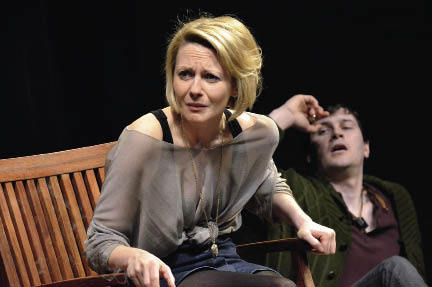Michael Attenborough, the spirited maverick who runs the Almeida, has lavished a first-rate production on David Eldridge’s new play.
Michael Attenborough, the spirited maverick who runs the Almeida, has lavished a first-rate production on David Eldridge’s new play. All that’s missing from this slick, visually pleasing show is any thought or utterance worthy of adult scrutiny. The script introduces us to a TV presenter, Lucy, recently dismissed for smoking heroin in her dressing-room. Skint, hooked on drugs and profoundly depressed, she follows a predictable downward spiral into theft, prostitution and homelessness and from there to counselling and the delusional ‘contentment’ of abstinence.
Eldridge is remarkably uncritical of the drug myths peddled by the counselling community. The fact is that narcotics are perfectly compatible with a rich, long and productive life as Thomas de Quincey, Samuel Coleridge, Sigmund Freud, Keith Richards, Stephen Fry — and even the occasional Spectator columnist — have shown. To guarantee longevity the wise consumer sticks to pure ingredients and judicious dosages. But sermonising therapists have monopolised the debate with their insistence that self-denial, rather than managed indulgence, is the only course for addicts in distress.
This ignores the uncomfortable truth that abstinence leads ex-addicts to alight on new forms of vexatious amusement — wife-beating, religious evangelism, caravanning, recreational litigation, or just mouthing off about their spurious achievements since they kicked the habit — all of which have the anti-social effect of harming innocent bystanders rather than the former druggies themselves. Addicts , with their weak wills and powerful egos, are licensed by their counsellors to go forth and inflict their garrulous narcissism on others rather than handling it in-house. This is a public nuisance we should be fighting, not promoting.
And yet this play, and the critical response to it, warmly endorses the slavish and self-pitying Lucy (played at top volume by Lisa Dillon) and applauds her embarrassing propensity to spend hour after hour, scene after scene, shrieking, carping, whingeing and weeping in the presence of her sister, her mother and various overpaid soul-manipulators. Lucy’s problem, in essence, is only marginally related to heroin. Her real trouble is self-nausea and slum-lust, and she uses opiates as a one-way ticket to the underclass degradation she secretly craves. Those like me who lack the constitution for hard drugs are nevertheless indignant that the counselling industry is able to recruit pompous, feeble-minded self-abusers like Lucy in order to make life difficult for those who want to dabble in narcosis without external interference.
This play is a shallow and blinkered act of propaganda which promotes the cause of mental serfdom. With its brittle characters, wonky dialogue, dated street jargon, wilful renunciation of humour and goofily sentimental conclusion it makes for a night of unusually heavy punishment. Liberated at last from the auditorium, I struggled to master a powerful urge to go out and score a wrap of celebratory smack.
To the Royal Court for a new play by Aleksey Scherbak direct from the dramatic hotbed of Eastern Europe. You know Aleksey Scherbak very well, of course, for it was he who took last year’s coveted ‘Grand Prize in the Belarus Free Theatre’s International Contemporary Drama Competition’. His play may struggle to speak directly to English audiences but it offers vital information for those champing at the bit to understand the ethnic tensions still active in Latvia. The ancient rivalries come to a head every year on 16 March, when the country remembers its war dead. The Latvian Russians, descendants of the occupiers, are now third-class citizens who feel duty-bound to honour the communist system they disavow. Some native Latvians express their patriotism by cheering the veterans who still totter out to parade in the SS uniforms they wore while shooting Russians during the war.
They’re opposed by modernising Latvians, who revile the old Nazis and are quietly supported by Latvian Russians. Trying to keep these overlapping factions and frictions in one’s mind is like doing quadratic equations while standing on your head reciting Milton. And the plot hasn’t started yet. The lead character, Sasha, is a Latvian Russian who gives a Remembrance Day interview on TV, in which he pleads for tolerance towards the ‘harmless old men’ in Nazi uniform. His house is sprayed with swastikas, his wife loses her job, his son gets mugged and his daughter rushes off to join the fascist resistance. The play’s scattered structure may be an artful nod to Latvia’s disunity but it makes for uneasy viewing. The best cast member, Sam Kelly on hilarious form as an SS veteran, is scandalously underused.
But, finally, after a sluggish start, the story sparks into life when a rebel vows to commit an atrocity on behalf of Mother Latvia. Then the lights go out. An electricity substation, one assumes, has been hit by a pre-planted bomb. But, no. The play has ended. Very puzzling. Aleksey Scherbak has earned indefinite leave to remain unperformed.







Comments